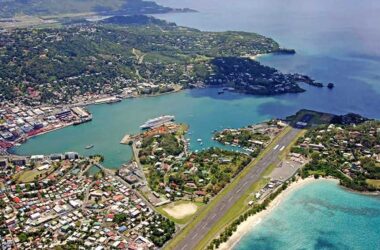OVER the past 10 years, citizens in the Organisation of Eastern Caribbean States (OECS) have grown increasingly concerned about the level of violent crime. Murder rates have risen from fewer than 15 cases per year in decades past to nearly 40 cases per year over the last few years in the most affected islands.
The increase in criminality is, in large measure, a consequence of stagnating economies and the disintegration of social and community structures. More specifically, the decline of agricultural export commodities and the difficulty of establishing new economic sectors have exacerbated an already high level of unemployment and poverty. The population is growing and mainly made up of young people, who represent the segment most prone to engaging in the criminal activities that challenge social peace.
The arithmetic of applying solutions to this problem in the single State environment is daunting. The opportunity cost of spending more on police, courts and prisons is a deficit in expenditure on education, health and infrastructure, which leads to lack of economic growth, higher unemployment and greater social distress, which will in turn require more police, courts and prisons.
In these circumstances, bear in mind that although the State has evolved to manage more functions over time, maintaining law and order remains its principal responsibility.
To fulfill this mandate, it is divided into three branches:
I. The executive, which manages the day-to-day affairs of the country, including enforcing the laws of the country.
II. The judiciary, which interprets the constitution and applies the laws when civil and criminal issues arise in society and must therefore be adjudicated upon.
III. The legislature, which makes the laws.
Justice and law and order must be seen in a logical progression if one is to assess their effectiveness and impact on a society, beginning with the police, followed by the courts and ending with the prisons.
Both elements must converge in their efficiency and effectiveness to ensure a functional system.
In all fairness to the existing police services, they are doing a remarkable job in the current circumstances given the overwhelming challenges they face and the manpower, finance and technology resources at their disposal. The avenues for promotion are restricted and the opportunities for specialization are extremely limited.
Against this backdrop, due consideration should be given to creating an OECS police service —a viable remedy for the disturbing trend of increased crime levels in the region.
The significance of regionalizing the police force is underscored as follows:
1. The perennial successes of the OECS Supreme Court (established in 1967) and the Eastern Caribbean Central Bank (ECCB established in 1983) demonstrate firmly that closer integration and co-operation have enabled the OECS to confront the many international, regional and national economic and social challenges it faces. This regional arrangement has proven very successful as there are tremendous cost benefits and objectivity is improved by sharing resources, which would serve well in our quest to optimize the dispensing of justice. Our regional organizational structures have harnessed our resources to provide the required clarity, purpose and direction for our islands to confront these challenges.
“Justice and law and order must be seen in a logical progression if one is to assess their effectiveness and impact on a society, beginning with the police, followed by the courts and ending with the prisons.”
2. It would effectively address the pressing issues we face. The Eastern Caribbean islands are in the middle of the chain between North and South America, one of the main routes for the transshipment of drugs. Both to the north —Jamaica— and to the south —Trinidad and Tobago—, the levels of crime and violence have reached higher and more sophisticated levels.
3. It would provide current members of the police service with more opportunities for upward mobility. The regional police force would comprise officers from the islands of the OECS —numbering at least eight members. Thus, a policeman in Antigua, Grenada, St. Kitts, St. Lucia or St. Vincent, for example, who aspires to the rank of police commissioner, would have at least eight options as opposed to just one under the current arrangements. Consequently, there is greater encouragement to improve productivity, etc.
4. It would create a wider area of jurisdiction. The area of jurisdiction of the OECS police force would extend from the Windward Islands to the Leeward Islands, as opposed to being restricted to individual island boundaries under the current dispensation. This regional structure would improve the organizational capabilities, dynamism and sophistication of the operation and management of policing, making police work even more interesting and increasing job satisfaction.
5. Discussions and negotiations with international entities and/or countries for technical and financial assistance —e.g. modern equipment (including aircraft and seacraft) and technology— would be more efficient, effective and conducive to fruitful outcomes. Such assistance with advanced technology and other appropriate resources would facilitate the much-needed functions of:
• Surveillance and monitoring of borders.
• Processing and analysis of relevant information for criminal investigations.
• Promotion of higher levels of training for officers.
The OECS is entering an era in which a constructive and strategic approach to its development could see it rise to levels which it did not dare think possible.
In recent times, attention has been paid by the international community to the modest successes of this regional body in areas such as the OECS Supreme Court and the ECCB. This is a clear indication that concentration of critical human and technical resources in centralized institutions is one strategy that has paid dividends and should be pursued in other areas.
— Kwame Venner
Economist














